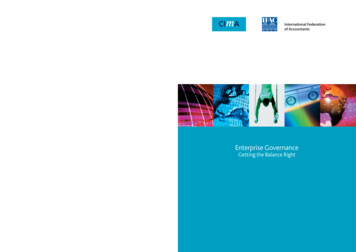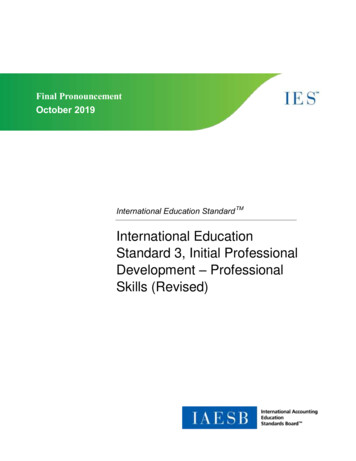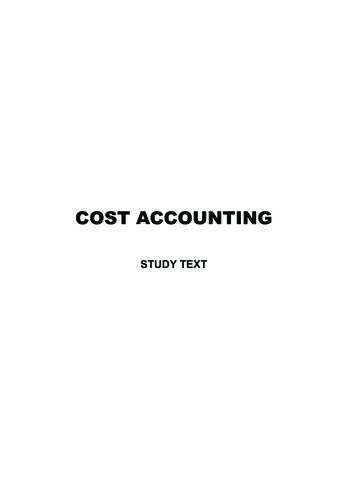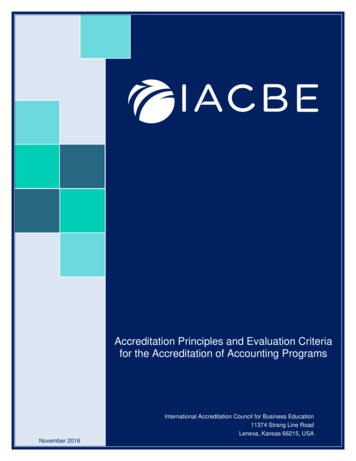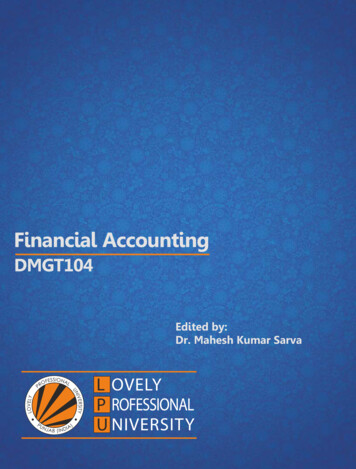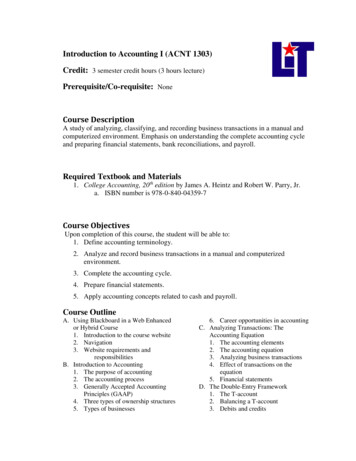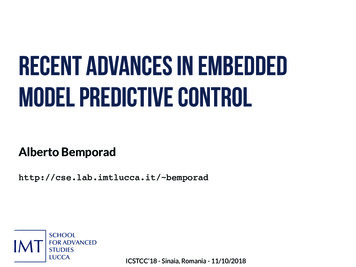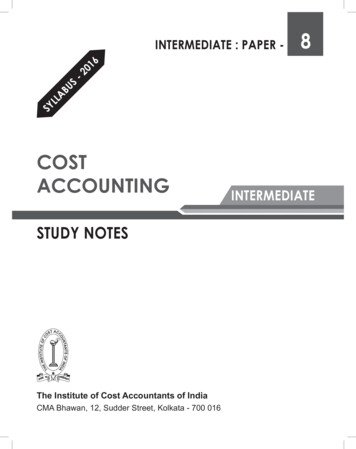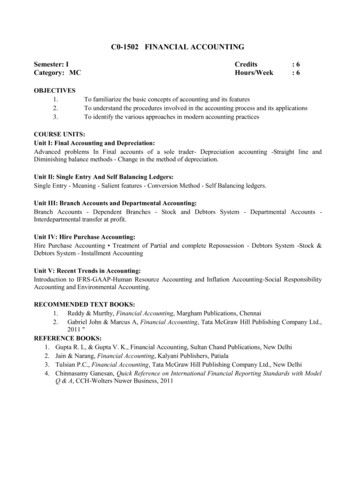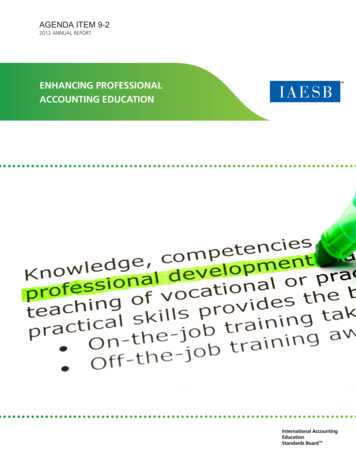
Transcription
AGENDA ITEM 9-22012 ANNUAL REPORTENHANCING PROFESSIONALACCOUNTING EDUCATION
Exposure Drafts, Consultation Papers, and other IFAC publications are published by, and copyright of, IFAC.IFAC does not accept responsibility for loss caused to any person who acts or refrains from acting inreliance on the material in this publication, whether such loss is caused by negligence or otherwise.The IFAC logo, ‘International Federation of Accountants’, and ‘IFAC’ are trademarks and service marks ofIFACCopyright July 2013 by the International Federation of Accountants (IFAC). All rights reserved. Permissionis granted to make copies of this work provided that such copies are for use in academic classrooms orfor personal use and are not sold or disseminated and provided that each copy bears the following creditline: “Copyright July 2013 by the International Federation of Accountants (IFAC). All rights reserved.Used with permission of IFAC. Contact permissions@ifac.org for permission to reproduce, store or transmitthis document.” Otherwise, written permission from IFAC is required to reproduce, store, transmit, ormake other similar uses of this document, except as permitted by law. Contact permissions@ifac.org.ISBN:Published by:2012 IAESB ANNUAL REPORT
Table of ContentsABOUT THE IAESB 5MESSAGE FROM IAESB CHAIR PETER WOLNIZER 7THE YEAR IN REVIEW 9INTERNATIONAL ACCOUNTING EDUCATION STANDARDS BOARD 12REPORT OF AILEEN PIERCE, CHAIR OF THE IAESB CONSULTATIVE ADVISORY GROUP 132012 IAESB ANNUAL REPORT
2012 IAESB ANNUAL REPORT
5About The IAESBThe International Accounting EducationStandards Board (IAESB) is an independentstandard-setting body that develops educationstandards, guidance, and information papers foruse by IFAC member bodies and other interestedstakeholders in professional accounting education,such as: Universities and education providers,employers, regulators, government authorities,accountants, and prospective accountants. Undera shared standard-setting process involving thePublic Interest Oversight Board, which oversees theactivities of the IAESB, and the IAESB ConsultativeAdvisory Group, which provides public interestinput, the IAESB develops its standards andguidance.The objective of the IAESB, as outlined in itsTerms of Reference, is to serve the public interestby: Promulgating a series of high-quality standardsand other publications reflecting good practice inthe education, development, and assessment ofprofessional accountants; Promoting the adoptionand implementation of the International EducationStandards; Developing education benchmarks formeasuring the implementation of the InternationalEducation Standards (IESs); and Advancinginternational debate on emerging issues relating1to the education, development, and assessment ofprofessional accountants.The IAESB’s membership consists of 18 volunteerboard members from around the world. The 18members comprise 9 practitioners and 9 individualswho are not members or employees of an audit firm(“non-practitioners”).1 At least three of the nonpractitioners are public members: individuals whoare expected to reflect, and are seen to reflect, thewider public interest.All board members are required to sign anannual statement declaring that they will act inthe public interest and with integrity in dischargingtheir responsibilities as a member of the IAESB.Members are appointed by the InternationalFederation of Accountants (IFAC) Board, basedon recommendations from the IFAC NominatingCommittee and with the approval of the PIOB.In developing its standards, independently andunder its own authority, the IAESB is required to betransparent in its activities, and to adhere to dueprocess as approved by the PIOB. Board meetings,including meetings by teleconference, are opento the public, and agenda papers are available atwww.iaesb meetings.org. In 2012 the IAESB met inperson three times and once by conference call.The IAESBdevelops andissues, in thepublic interest,standards andguidance on thelearning anddevelopmentrequired todevelop andmaintaincompetenceover the careerof a professionalaccountantA non-practitioner is an individual who is not a member or employee of an audit practice firm and, in respect to individualswho have been members or employees of such firms, are normally subject to a cooling-off period of three years.2012 IAESB ANNUAL REPORT
6FIGURE 1: IAESB oughtLeadershipand AdvocacyThe structures and processes that support theoperations of the IAESB are facilitated and supportedfinancially by IFAC. The IAESB is a component of theoverall IFAC reporting entity; accordingly, its financial2012 IAESB ANNUAL REPORTresults are included within IFAC’s audited financialstatements. These financial statements are publishedas part of IFAC’s Annual Report, which is available atwww.ifac.org.
7Message From IAESBChair Peter WolnizerDuring 2012, we made significant progress inmeeting the Board’s strategic initiatives of: Revising thesuite of IESs; Developing adoption and implementationguidance; and Improving communications aroundthe awareness of the IESs. We believe that the publicinterest is served by setting education standards thatclarify the expectations for competence of professionalaccountants so as to build a foundation upon whichpublic trust is achieved.FIGURE 2: IAESB Strategic ObjectivesPublic InterestPromulgating aseries ofhigh-qualitystandards andotherpublicationsreflecting goodpractice in theeducation,development,and assessmentof professionalaccountants;Promoting theadoption andimplementationof theInternationalEducation StandardsWe have focused our work on clarifying theobligations of member bodies and other interestedstakeholders in the delivery, development, andassessment of professional accounting education. Inpart, this has been achieved through the approvalof education standards in the areas of: (a) entryrequirements into professional accounting educationprograms (IES 1); (b) practical experience (IES 5) andassessment (IES 6) for initial professional development;and (c) continuing professional development (IES 7) ofa professional accountant.We continue to improve upon the awareness ofthe IESs by engaging with stakeholders interested inprofessional accounting education. We have focusedour communications to reinforce our message onthe merits of implementing the education standardswith developing and developed member bodies,Developingeducationbenchmarks formeasuring theimplementationof theInternationalEducation StandardsAdvancinginternationaldebate onemerging issuesrelating to theeducation,development,and assessmentof professionalaccountantsacademic associations, professional associations,government authorities, and professional accountants.IESs promote quality in accounting educationworldwide, helping IFAC member bodies, professionalaccountancy organizations, and others educate andtrain competent professional accountants who willcontribute positively to their communities throughouttheir careers. IESs also advance convergence andconsistency in the application of international technicaland practice standards by ensuring a common base ofeducation and practical experience for all professionalaccountants. Developing and implementing IESscan also contribute to other desirable outcomes,including reduction in international differencesin the requirements to qualify and work as aprofessional accountant, facilitation of the globalmobility of professional accountants, and provision of2012 IAESB ANNUAL REPORT
8New workingrelationshipshave beenforged with theUnited NationsConferenceon Trade andDevelopment(UNCTAD),the GlobalAccountingAlliance, andthe Associationto AdvanceCollegiateSchools ofBusiness(AACSB)2012 IAESB ANNUAL REPORTinternational benchmarks against which IFAC memberbodies can measure themselves.Additionally, we have encouraged our stakeholdersto engage in the revision project and solicited inputon the development of the revised IESs. New workingrelationships have been forged with the United NationsConference on Trade and Development (UNCTAD),the Global Accounting Alliance, and the Associationto Advance Collegiate Schools of Business (AACSB),which have expertise and influence on humancapacity building and the development of professionalaccountants.However, we recognize our work on the revisionof the standards will only have impact once the publicinterest has been served. In considering our directionfor 2014-2016 we have reflected on the Board’s corereason for existence, higher purpose, and mission asthey relate to its broad public interest mandate. Whileits primary work as a standard setter for professionalaccounting education will be ongoing, the IAESBwill continue to work with its stakeholders over thenext three years to provide support by developingguidance on the implementation of the IESs, engagein advocacy by promoting adoption of the revisedIESs, and contribute to capacity building by developingbenchmarks for implementing the revised IESs. Thiswork is intended to enhance the public’s confidencein the competence and judgment of accountingprofessionals.We look forward to 2013 with a strongcommitment to completing the work on revising theremaining IESs and to developing the 2014-2016IAESB Strategy and Work Plan. Finally, on behalf of theIAESB, I wish to thank my predecessor, Mark Allison,under whose leadership the initial work of the IAESB2010 – 2013 Strategy and Work Plan took place. Iowe a great debt of gratitude for the voluntary, yetdiligent contributions of IAESB members and theirtechnical advisors, as well as the administrative andmanagement support by IFAC staff.
9The Year in ReviewHighlights on the RevisionProject to Clarify theInternational EducationStandardsIES 1, ENTRY REQUIREMENTS FOR PROFESSIONALACCOUNTING EDUCATION PROGRAMSIn addressing the public interest concern ofensuring competent professional accountants theIAESB approved IES 1, Entry Requirements forProfessional Accounting Education Programs, whichprescribes the principles to be used when settingand communicating educational requirementsfor entry to professional accounting educationprograms. This IES is intended to protect the publicinterest by both establishing fair and proportionateentry requirements that help those individualsconsidering professional accounting education makeappropriate career decisions-and ensuring thatrequirements for entry to professional accountingeducation are not misrepresented.IES 1 explains the principle of allowing flexibleaccess to professional accounting educationprograms under the auspices of an IFAC memberbody, while ensuring that aspiring professionalaccountants have a reasonable chance of successfulcompletion of professional accounting educationprograms. IES 1 becomes effective from July 1,2014.IES 5, INITIAL PROFESSIONAL DEVELOPMENT –PRACTICAL EXPERIENCEIn meeting the public’s expectation thatprofessional accountants apply their experience andknowledge in carrying out their roles, the IAESBapproved IES 5, Initial Professional Development –Practical Experience. IES 5 prescribes the practicalexperience required of aspiring professionalaccountants by the end of Initial ProfessionalDevelopment (IPD). This IES refers to practicalexperience as workplace and other activities thatare relevant to developing professional competence.Practical experience during IPD builds on generaleducation and programs of professional accountingeducation. The revised IES 5 requires IFACmember bodies to establish a preferred methodto measure practical experience by one of thefollowing approaches: input-based, output-based,or a combination of input- and output-based. Inaddition, IFAC members shall require practicalexperience of aspiring professional accountants tobe: conducted under the direction of a practicalexperience supervisor; recorded in a consistent formand supported by verifiable evidence; reviewedperiodically by the practical experience supervisor;and assessed for successful completion. Theserequirements address the public’s expectationthat a professional accountant has completed aprofessional accounting education program andhas obtained sufficient practical experience. IES 5becomes effective from July 1, 2015.IES 6, INITIAL PROFESSIONAL DEVELOPMENT –ASSESSMENT OF PROFESSIONAL COMPETENCEThe public interest is protected, and thecredibility of the profession is enhanced, whenonly those individuals who meet the profession’scompetence requirements are permitted to beprofessional accountants. To support this positionthe IAESB has approved IES 6, Initial ProfessionalDevelopment – Assessment of ProfessionalCompetence. This revised IES prescribes therequirements for the assessment of professionalcompetence of aspiring professional accountantsthat need to be achieved by the end of IPD. Morespecifically, the revised standard requires IFACmember bodies to formally assess the achievementof competence by the end of IPD while recognizingthat the assessment needs to be reliable, valid,equitable, transparent, and sufficient. In addition,IES 6 requires that IFAC member bodies basethe assessment of professional competence ofaspiring professional accountants on verifiableevidence. Although the assessment of professionalcompetence during IPD is the responsibility of IFACmember bodies, other stakeholders may providesubstantive input into assessment activities. IES 6becomes effective from July 1, 2015.IES 7, CONTINUING PROFESSIONAL DEVELOPMENTThe IAESB recognizes that ContinuingProfessional Development (CPD) is an importantelement in maintaining public confidence and trust.Because professional accountants have a continuingduty to maintain professional competence to ensure2012 IAESB ANNUAL REPORT
10that clients, employers, and relevant stakeholdersreceive competent professional service the IAESBhas approved the clarified IES 7, ContinuingProfessional Development. IES 7 prescribes the CPDfor professional accountants required to developand maintain their professional competence so as toprovide high quality services to clients, employers,and other stakeholders. The clarified IES 7 continuesto require the IFAC member body to promote andfacilitate CPD while confirming the recommendedapproaches for measuring mandatory CPD activity.IFAC member bodies are also required to monitorthe CPD of professional accountants and to enforcesanctions where needed. IES 7 becomes effectivefrom January 1, 2014.Each of these revised IESs is addressed to IFACmember bodies that have responsibility in areas of:(a) setting and communicating entry requirements;(b) assessment of learning outcomes; (c) practicalexperience; and (d) continuing professional2012 IAESB ANNUAL REPORTdevelopment. In addition, these IESs will be helpfulto educational organizations, employers, regulators,government authorities, and any other stakeholderswho deliver and support provision of professionalaccounting education programs.EXPOSURE DRAFTSThe IAESB has also continued its work torevise and redraft the remaining IESs. During2012 the IAESB approved for public exposure thefollowing Exposure Drafts: IES 2, Initial ProfessionalDevelopment – Technical Competence, IES 3, InitialProfessional Development – Professional Skills, IES4, Initial Professional Development – ProfessionalValues, Ethics, and Attitudes; and IES 8, ProfessionalDevelopment for Engagement Partners Responsiblefor Audits of Financial Statements. The releaseof the Exposure Drafts as a set has enabled ourreaders to appreciate the breadth and depth of
11learning outcomes needed to achieve professionalcompetence.The IAESB has received a substantial numberof responses on these Exposure Drafts frominterested stakeholders, including: IFAC memberbodies; members of the forum of firms; regulators;professional organizations; and individuals andother organizations. These responses have assistedthe Board in improving the clarity of the standardsand in increasing their relevance with regards tothe development, delivery, and assessment ofprofessional accounting education. The IAESBexpects that the finalization of the revised IESs 2, 3,and 4 will occur during 2013 while IES 8 is expectedto be finalized in 2014.Development of Adoption andImplementation GuidanceThe IAESB has also contributed to theadoption and implementation of its IESs throughits outreach activities, pronouncements, andtechnical advice. In March, Professor Peter Wolnizerand Professor Aileen Pierce (IAESB ConsultativeAdvisory Group (CAG) Chairperson) attended theopening ceremonies of the National Association ofAccounting and Business Administration Schools(ANFECA) Annual Congress to witness the InstitutoMexicano de Contadores Publicos’ recognition ofANFECA for “University Academic Heritage”.This recognizes ANFECA’s contribution to thedevelopment of professional accountants in Mexico.In August Professor Peter Wolnizer and Mr. FabioMoraes da Costa (CAG member) presented at theBrazil Accounting Congress on the InternationalEducation Standards (IESs) and the importance ofContinuing Professional Development. Both of theseevents enabled the IAESB to engage educationalrepresentatives on local issues in the area ofprofessional accounting education.The IAESB has also published an article in Issuesin Accounting Education that discusses the workof the IAESB and explains the Board’s view onconvergence in the area of professional accountingeducation.CommunicationsFinally, the IAESB has also made importantprogress in improving the awareness of itspronouncements and projects by participatingin meetings and conferences with memberbodies, regulators, regional organizations, andthe academic community. The IAESB Chair andother IAESB representatives have presentedupdates during 2012 on the IES revision projectat conferences and meetings, inclucing theAmerican Accounting Association 2012 AnnualMeeting, the European Accounting Association35th Annual Congress, and the UNCTAD/ISARand IFRS Foundation Accounting Education Forum‑.In addition the IAESB has responded by commentletter to IFAC’s exposure draft on the Statements ofMembership Obligations.Oversight and AdviceFinally, the IAESB also acknowledges theoversight and advice that the PIOB has providedduring 2012. The PIOB’s observations at the 2012IAESB and IAESB Consultative Advisory Group (CAG)meetings provided valuable independent perspectiveon the manner in which the board has followedits stated due process activities and recognized thepublic interest in developing the IESs.The IAESB has also continued to benefit fromthe leadership of the independent chair of theIAESB CAG and the advice it receives from theCAG members at all stages of the Board’s projects.Further details on the CAG’s activities during 2012are set out in the “Report of Aileen Pierce, Chair ofthe IAESB Consultative Advisory Group.”SYLVIA MELJEM OF THEINSTITUTO MEXICANO DECONTADORES PUBLICOS(IMCP),SPEAKING AT THE EDUCATIONFORUM, SPONSORED BYIMCP, IAESB, AND THENATIONAL ASSOCIATION OFACCOUNTING AND BUSINESSADMINISTRATION SCHOOLS.2012 IAESB ANNUAL REPORT
12International AccountingEducation Standards Board(January 1, 2012 to December 31, 2012)TermEndingCountryTechnical AdvisorsChris Austin*2013United KingdomAdrian PulhamKazuo Hiramatsu2012JapanKoichi InoueEdward Kieswetter*2013South AfricaLaine KatzinPeter Wolnizer,* Chair2014AustraliaMohammed Saleem Kharwa,* Deputy Chair2013South AfricaAmanda Jane OlivierKim Langfield-Smith2013AustraliaJayne FreemanBoard MembersPublic MembersNon-PractitionersSylvia Meljem2012MexicoJose A. EcheniqueDennis Reigle*2014United StatesGary PrevitsClare Minchington2014United KingdomClare MorleyJean-François Bélorgey*2012FranceSusan FlisMarcelo Canetti2013ArgentinaGreg OwensAnn Kilbride*2012United KingdomGareth WellingsHans Christian Krogh**2013DenmarkRobert TaylorAnne-Marie Vitale**2013United StatesSophie Gates-SumnerEileen Walsh2014United StatesAndrew BarryKristrún Helga Ingólfsdóttir2012IcelandAnette HedbernNambayo Kalaluka2013ZambiaMubita AnakokaThomas Orth2013GermanyWolfgang BöhmJaydeep Narendra Shah2014IndiaSubodh KumarAgrawalPractitionersObserversAileen Pierce, IAESB Consultative Advisory Group Chair, IrelandAnne Loft, International Association of Accounting Education and Research, United StatesYoseph Asmelash, United Nations Conference on Trade and Development, SwitzerlandIAESB StaffJim Sylph, Executive Director, Professional Standards and External RelationsDavid McPeak, Senior Technical ManagerStephenie Luciani, Executive Assistant*Member of IAESB Steering Committee** Partial Year2012 IAESB ANNUAL REPORT
13Report Of Aileen Pierce, Chair of theIAESB Consultative Advisory GroupIt was a great honor for me to take over as chairof the IAESB’s Consultative Advisory Group (CAG)effective January 1, 2012.Objective and Scope ofActivitiesI am pleased to report the work of the IAESBCAG during 2012 has continued to focus on theIAESB’s initiative to revise and redraft its eightIESs. In providing directional advice on the board’scurrent work plan, technical advice on the revisionof its standards, and strategic advice on thedevelopment of the 2014–2016 IAESB Strategy andWork Plan, the CAG continues to meet its objectiveof providing advice to the IAESB as it advances itsagenda.Meetings and MembershipThe 2012 CAG meetings were held in Dublinin February and New York in September and viateleconference in April. As chair, I also attendedall IAESB meetings and three IAESB SteeringCommittee teleconferences during the year toobserve how the CAG’s advice was considered bythe board.The CAG’s membership remained at 16organizations during 2012.Key Highlights for 2012ADVICE ON PROJECTSThe CAG has continued to contribute advice onissues relating to revising and redrafting all eightIESs. At the request of the CAG, all IESs are: (1)principles-based; (2) clarified based on the IAESBdrafting conventions on clarity; and, (3) consistentwith concepts of the Framework for InternationalEducation Standards for Professional Accountants(2009). Specifically, the CAG’s advice has led toimprovements in developing the following: Final versions of IESs 1, 5, and 6 (June–October); Exposure Drafts for IESs 2, 3, 4, and 8 (June);and Guidance on the implementation of IES 8 andon the implementation of a learning outcomesapproach to professional accounting education.ADVICE ON THE IAESB’S 2014–2016 STRATEGYAND WORK PLANCAG members provided input into thedevelopment of the 2014–2016 IAESB Strategy andWork Plan. More specifically, the CAG contributedto identifying emerging educational issues andtrends, defining strategic priorities, and articulatingthe IAESB’s value proposition. This enabled theIAESB to develop a preliminary view on its strategicpriorities and, in particular, which projects andactivities it should consider for the 2014–2016period.CommunicationsThe CAG also provided advice on the 2012IAESB Communications Plan. This advice has ledto improvements in clarifying the communicationsmessages and identifying target audiences. TheCAG also provided advice on the MonitoringGroup’s review and IFAC’s review of the Statementsof Membership Obligations.In the period covered by this report, I andCAG members have increased awareness of theIAESB’s activities by making presentations atinternational events (e.g., 35th Annual EuropeanAccounting Association Congress, 19th BrazilianCongress of Accounting, and the Accountingand Finance Association of Australia and NewZealand 2012 Conference) and by being presentat additional events (e.g., opening ceremonies ofNational Association of Accounting and BusinessAdministration School’s Annual Congress;Fédération des Experts Comptables Européens’ 25thAnniversary event; and the Institute of CharteredAccountants in England and Wales’ hosted dinner).ConclusionI would like to thank the members of the CAGfor their commitment and contribution to the IAESBagenda. I would also like to thank the members ofthe IAESB and, in particular, the chairs of the IAESBtask forces for the efficient way in which the variousissues and draft documents are presented to theCAG.Finally, I would like to express my thanks to thestaff of IFAC for their excellent support of the CAG.2012 IAESB ANNUAL REPORT
For more information about the IAESB, please contact:David McPeakSenior Technical Manager, IAESBDavidMcPeak@ifac.orgwww.iaesb.org
for entry to professional accounting education programs. This IES is intended to protect the public interest by both establishing fair and proportionate entry requirements that help those individuals considering professional accounting education make appropriate career decisions-and ensuring that requirements for entry to professional accounting
